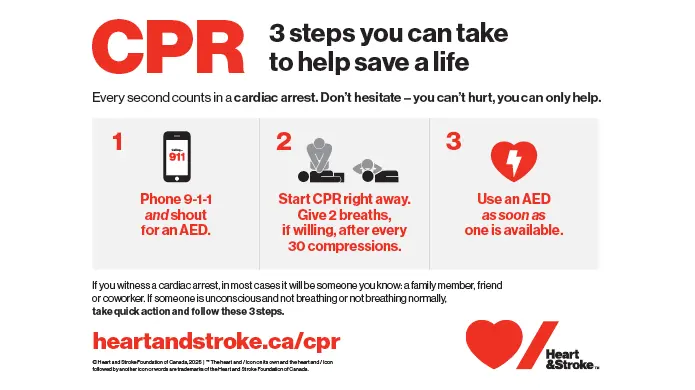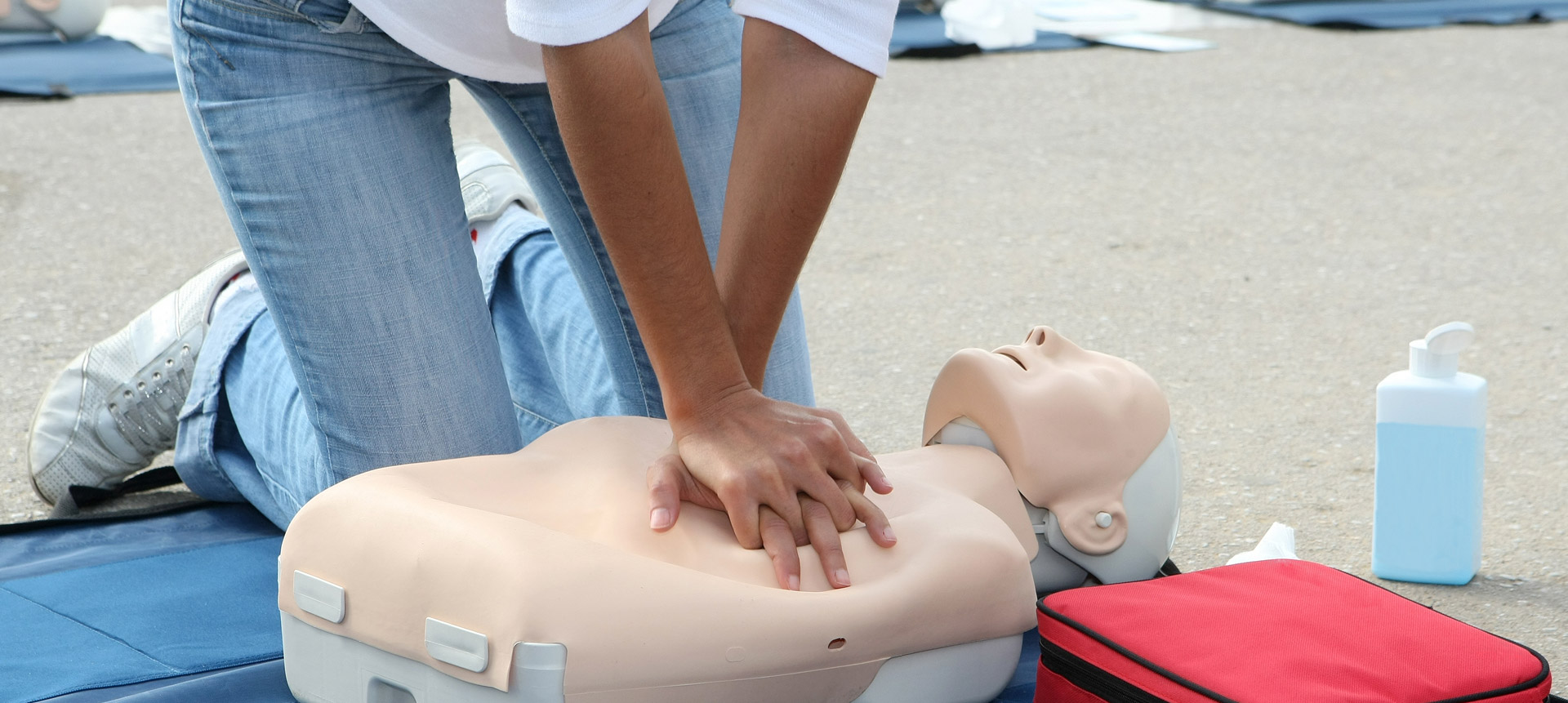How to do CPR
Doing CPR and using an AED on a person in cardiac arrest can double their chance of survival.


Learning how to do CPR and use an AED equips you with the life-saving skills and confidence to act quickly in a cardiac emergency.
Find a course Find a courseHeartsaver® is a short CPR and automated external defibrillator (AED) course that focuses on practical skills and knowledge that will help you to respond confidently and effectively in a cardiac arrest emergency.
Our course is geared to students with little or no medical knowledge or training – making it ideal for you if your job requires you to learn life-saving techniques for the workplace or if you’re simply interested in developing these critical skills.
Heart & Stroke’s certified First Aid courses teach essential life-saving skills to help you respond confidently in medical emergencies. Our CSA-compliant training meets national standards for workplace safety and is recognized across most of Canada. Courses are tailored to your location and needs and provide a nationally recognized certification, should you need it for work, volunteering or academic programs.
You’ll learn CPR, AED use, wound care, emergency scene management, and more through scenario-based practice.
Choose Basic First Aid for foundational skills or Intermediate First Aid for broader emergency care.
CardiacCrash™ is Heart & Stroke's award-winning resuscitation program that introduces life-saving techniques in a fun, engaging and memorable way.
Our short, fast-paced program uses an interactive, gamified approach and a true-to-life scenario to introduce hands-only CPR and AED skills to workplaces and schools.
Teams compete for points by answering questions correctly and winning their group’s chest-compression practice session, which is judged by the facilitator of CardiacCrash™ who monitors the quality and determines the winner.
To learn how to get the workplace version and/or school version of CardiacCrash™ or to become a facilitator, email us: cardiaccrash@heartandstroke.ca
Basic Life Support (BLS) is the foundational course in Canada for saving lives. It is designed for healthcare providers and trained first responders who provide care to patients in a wide variety of settings or for people in a healthcare training program.
BLS teaches single-rescuer and team basic life support skills for application in both pre-hospital and in-facility environments, with a focus on high-quality CPR and team dynamics.
You will learn to quickly recognize several life-threatening emergencies, give high-quality chest compressions, deliver appropriate ventilations and provide early use of an AED through simulated clinical scenarios and learning stations.
Offered in blended or instructor-led formats, Heart & Stroke’s BLS course provides nationally recognized certification – ideal if required for your job or professional designation. It is valid for one year.
This also includes ACLS for Experienced Providers (ACLS-EP).
Advanced Cardiovascular Life Support (ACLS) is the pre-eminent resuscitation course for the recognition and intervention of cardiopulmonary arrest or other cardiovascular emergencies. This advanced course builds on foundational basic life support (BLS) skills and takes healthcare provider training to the next level.
Learners can expect hands-on training in team dynamics, communication, systems of care, and clinical topics such as immediate post-cardiac arrest care, acute dysrhythmia, stroke and acute coronary syndromes – using simulation, role-playing and the CPR Coach role to enhance outcomes.
You can choose between blended or traditional formats. Heart & Stroke’s ACLS certification is valid for two years, recognized across Canada and essential for many clinical roles.
Pediatric Advanced Life Support (PALS) is an advanced resuscitation course for the recognition and intervention of cardiopulmonary arrest or other cardiovascular emergencies in pediatric patients.It builds on skills learned in Heart & Stroke’s BLS course and/or Pediatric Emergency Assessment, Recognition and Stabilization (PEARS) course.
Designed for healthcare providers involved in managing critically ill pediatric patients, this course helps you to apply your BLS skills and develop a systematic approach to pediatric assessment, treatment algorithms and team-based care. Through hands-on training, you will strengthen your ability to contribute to or lead a PALS team. The course emphasizes effective teamwork, communication and the CPR Coach role in pediatric settings.
The Pediatric Emergency Assessment, Recognition and Stabilization (PEARS) course is an intermediate-level course that builds on BLS concepts and can serve as a pathway to Pediatric Advanced Life Support (PALS) certification.
PEARS provides healthcare providers who occasionally care for children with essential skills to help manage respiratory distress, shock and cardiopulmonary arrest during the initial response. It’s designed for professionals working in diverse settings – such as rural clinics, schools or large urban centres – where scopes of practice can vary.
Through active, case-based learning, you’ll develop the skills to deliver life-saving care during the critical moments before advanced support arrives.
Heart & Stroke’s PEARS certification is valid for two years.
Heart & Stroke has released the Canadian edition of the 2025 Guidelines for Cardiopulmonary Resuscitation (CPR) and Emergency Cardiovascular Care (ECC). Grounded in the latest science, these guidelines will shape life-saving education across Canada. As Canada’s leader in resuscitation education and the only Canadian council representative on the International Committee on Resuscitation (ILCOR), Heart & Stroke actively contributes to the global review of resuscitation science, helping shape the treatment recommendations. We then localize these guidelines to reflect Canada’s unique healthcare landscape.
CoSTRs (Consensus on Science with Treatment Recommendations) are a series of publications developed by the International Liaison Committee on Resuscitation (ILCOR). Each CoSTR summarizes the latest scientific evidence and provides treatment recommendations for emergency care, including CPR, first aid and advanced life support. These publications are the result of ILCOR’s continuous evidence evaluation process conducted by task forces composed of international experts. Before finalizing any recommendations, ILCOR invites public comment via ILCOR.org. Healthcare professionals, educators and other interested individuals are encouraged to review draft CoSTRs and provide feedback. Their input helps ensure that the recommendations are clear, practical and grounded in real-world experience. Member councils—such as Heart & Stroke in Canada—then use these CoSTRs to inform the development of guidelines localized for their jurisdictions.
Doing CPR and using an AED on a person in cardiac arrest can double their chance of survival.

In Canada, an estimated 60,000 cardiac arrests occur outside of a hospital setting each year. Knowing how to use an AED could help save a life.
Anyone can use an AED. Get the basics here.... Read more
AEDs are simple and easy to use. Watch this video to learn how..... Read more
Every second counts, a new Heart & Stroke report, reveals the critical state of cardiac arrest in Canada and how we can save more lives.
